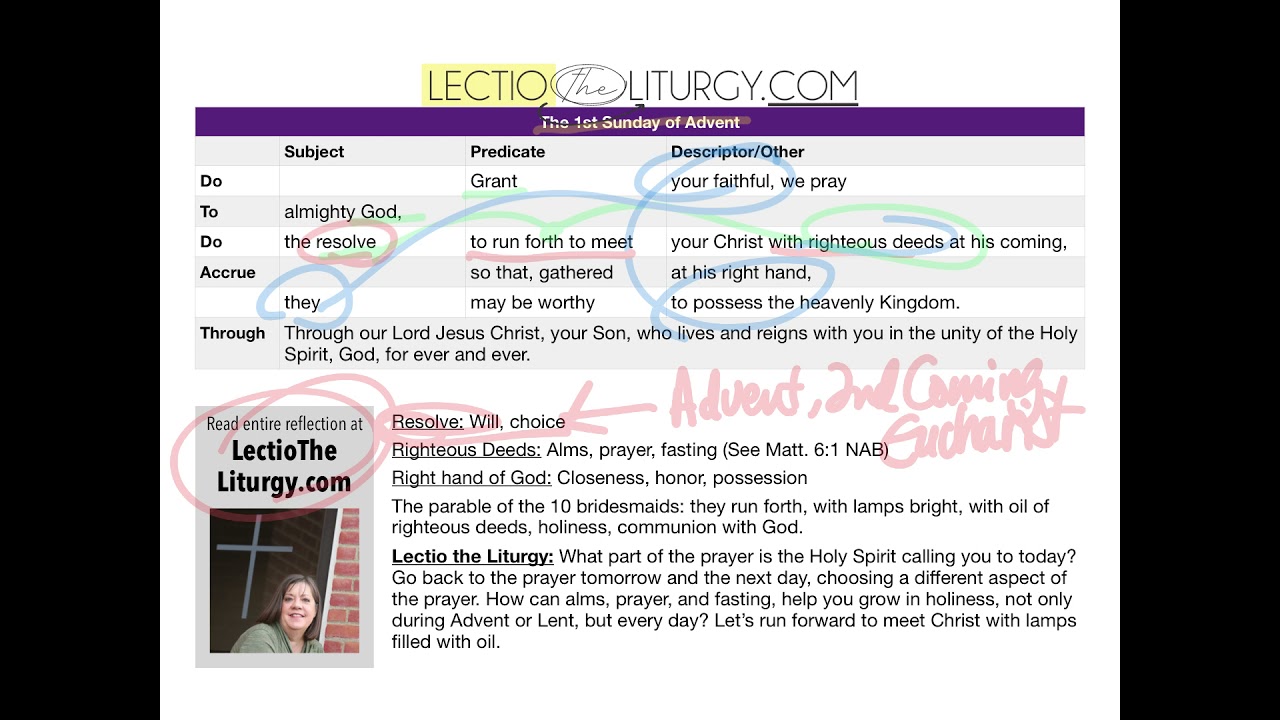Collect 1st Sunday of Advent
Happy new year! This week, the First Sunday of Advent, begins a new year in the Church’s calendar. The Church gives us a prayer we can meditate on all year. This week we Lectio the Liturgy with the Collect for the First Sunday of Advent.
Grant your faithful, we pray, almighty God, the resolve to run forth to meet your Christ with righteous deeds at his coming, so that, gathered at his right hand, they may be worthy to possess the heavenly Kingdom. Through our Lord Jesus Christ, your Son, who lives and reigns with you in the unity of the Holy Spirit, God, for ever and ever.
Be warned: there is a lot to think about in this prayer. Don’t be surprised if you need a week to meditate on it. Some of the most productive times of Lectio Divina I have experienced, have been studying Collects. This is one example. (If you are interested in a weekly lectio study guide, consider joining my email list.)
I love words, I’ve found they often don’t mean what I think they mean, and resolve is one of them. Used here, resolve means will, or choice. We pray that our will is to run to meet Christ, not with empty hands, but with righteous deeds.
When the prayer tells us that we will go to meet our Christ, it implies that he’s also coming to meet us. With the beginning of Advent, we focus on his coming in the Nativity. The Gospel this week will remind us that we will meet him, not only when we pass from this life, but at his Second Coming. However, we also meet Christ every time we receive Communion.
Why does the prayer say righteous deeds and not good? Is there a difference? I’ve been studying righteous deeds all week. Matthew 6:1 (NAB) tells us not to perform our righteous deeds so others can see them. Other Bible translations use the words righteousness, justice and alms. Priest and biblical scholar, George Leo Haydock, wrote that in this chapter of the book of Matthew, chapter six, the Savior gives us the three significant good works in the forms of alms, prayer, and fasting. These three are the basis of righteous deeds.
Notice that these righteous deeds are meant to be unseen. Moreover, alms, prayer, and fasting are intended to assist us in our path to holiness.
Next, we have a reference to the right hand of God. In Matthew 25:32-33, Jesus tells us the sheep will be separated from the goats and the sheep will be at the right hand of God. The phrase “right hand of the Father,” shows up a few times in Scripture. It points to closeness (Ps. 16:8), possession (Ps. 78:54), honor (Ps.45:9), power (Ps. 60:5, 118:16), or authority (Ps.110:1).
When using words like closeness, possession, and honor, there is something warming and it almost feels intimate to be that close to God, to be His, and to be under his protection. Yet, that is where we are called to be. Not when we die, but right here, today, we can be at His right hand. This is the importance of Communion, or communion, common union with God.
Also note that to be gathered at his right hand is the dependent phrase. To Accrue, or obtain it, we must run toward him with righteous deeds.
It’s the parable of the ten bridesmaids in a nutshell. Scripture tells us that there was a cry made and they were told to “go out to meet the bridegroom!” but only five had enough oil. The oil in the parable isn’t oil, it is relationship with God, and it cannot be purchased or shared, I can’t give you some of mine. This relationship requires our righteous deeds. It’s this oil that keeps our flame bright as we run forth to meet Christ.
Lectio the Liturgy: What part of the prayer is the Holy Spirit calling you to today? Go back to the prayer tomorrow and the next day, choosing a different aspect of the prayer to reflect upon. How can alms, prayer, and fasting, help you grow in holiness, not only during Advent or Lent, but every day? Let’s run forward to meet Christ with our lamps filled with oil.
